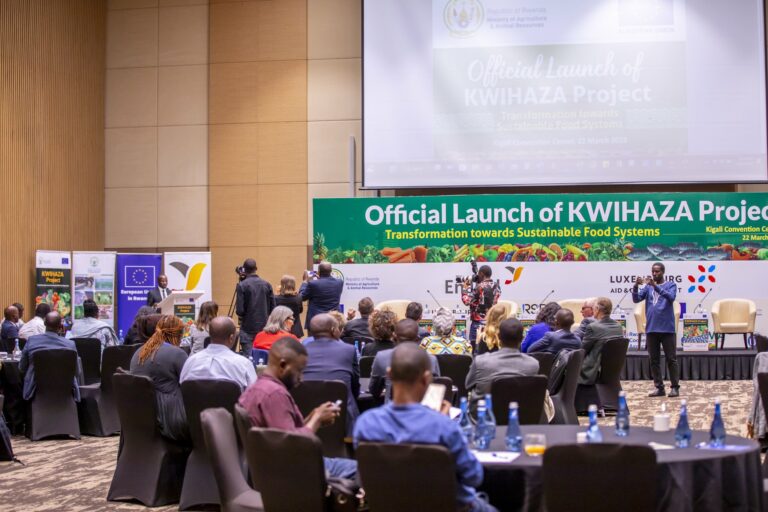
The Ministry of Agriculture and Animal Resources (MINAGRI) jointly with the European Union, the Luxembourg Development Cooperation Agency (LuxDev) and the Belgian development agency (Enabel) launched the “KWIHAZA” project supporting Transformation towards Sustainable Food Systems.
This 4-year programme (2023-2026) will develop the value chains in the aquaculture, fishery and horticulture sectors. Smallholder producers in these sectors are characterized by low production and profitability and need more technical competence. While there are many opportunities in domestic and foreign markets, the development of sectors is constrained by many factors, including low trust and weak relations between smallholder producers and other value chain actors; poor processing and cold chain infrastructure and logistics; limited access to finance, and weakly implemented quality assurance systems, norms, and standards, among others.
With funding of the European Union and Luxembourg (10 million euros and 5.5 million euros respectively), the “KWIHAZA” project will promote the development of aquaculture, fishery and horticulture sectors by providing training to smallholders and setting up research centers to improve the quality and meet market standards. The initiative also aims at promoting the consumption of healthy and sustainably produced local food and increasing farmers’ income.
The Ambassador of the European Union to Rwanda, H.E. Belén Calvo Uyarra stressed: “Aligned to the GoR priorities, “KWIHAZA” project will build the capacities of smallholder groups, SMEs, cooperatives and aspiring young entrepreneurs to be active in aquaculture, fishery, and horticultural value chains, to improve the quality and quantity of produce, minimize post-harvest losses and enhance access to local and regional markets. The project will contribute to creating decent jobs and more sustainable food systems.’’
Rwanda’s Minister of Agriculture and Animal Resources, Dr. Ildephonse Musafiri, said: “It is my privilege and great honor to officiate the launch of the KWIHAZA PROJECT under the theme of, “Transformation towards sustainable food systems”, which I believe will leave a transformative impact in the development of Rwanda’s aquaculture, fishery and horticulture sectors for the next four years”.
He added: “Any investment in the agriculture sector is an investment to the national economy since in Rwanda agriculture is the dominant sector in the nation’s economy”.
The “KWIHAZA” project will be implemented by the Belgian development agency Enabel together with the Ministry of Agriculture and Animal Resources through the Rwanda Agriculture Board (RAB) and other government institutions including National Agriculture Exports Board (NAEB), Rwanda Inspectorate, Competition and Consumer Protection Authority (RICA), Rwanda Standards Board (RSB), University of Rwanda (UR) – Rwasave Research Center, Rwanda Environment Management Authority (REMA) and districts.
